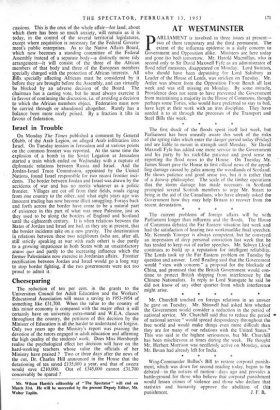AT WESTMINSTER
pARLIAMENT is involved in three issues at present— two of them temporary and the third permanent. The extent of the influenza epidemic is a daily concern to Government and Opposition alike. Ministers are here today and gone (to bed) tomorrow. Mr. Harold Macmillan, who is second only to Sir David Maxwell Fyfe as an administrator of flood relief measures, disappeared on Monday. Lord Swinton, who should have been deputising for Lord Salisbury as Leader of the House of Lords, was stricken on Tuesday. Mr. Attlee was absent from the Opposition Front Bench all last week and was still missing on Monday. By some miracle, Providence does not seem to have prevented the Government from maintaining a majority in the House of Commons, though perhaps some Tories, who would have preferred to stay in bed, have kept at their work with an iron discipline. They have needed it to sit through the processes of the Transport and Steel Bills this week.
* * * * The first shock of the floods spent itself last week, but Parliament has been uneasily aware this week of the risks of the spring tides which enter the danger period today (Friday) and are liable to mount in strength until Monday. Sir David Maxwell Fyfe has added one more service to the Government and his party by his rock-like patience and good sense in reporting the flood news to the House. On Tuesday Mr. James Stuart gave the House its first official news of the appal- ling damage caused by gales among the woodlands of Scotland. He shows patience and good sense too, but it is rather that of a drowsy philosopher. The scale of the timber operations that the storm damage has made necessary in Scotland prompted several Scottish members to urge Mr. Stuart to bring in the aid of the Canadians, who have already asked the Government how they may help Britain to recover from the recent devastation. * * * * The current problems of foreign affairs will be with Parliament longer than influenza and the floods. The House of Commons debated the Far Eastern situation last week and had the satisfaction of hearing two workmanlike final speeches. Mr. Kenneth Younger is always competent, but he conveyed an impression of deep personal conviction last week that ho has tended to keep out of earlier speeches. Mr. Selwyn Lloyd continues to build up a reputation for intelligent reliability. The Lords took up the Far Eastern problem on Tuesday by question and answer. Lord Reading said that the Government would " view with concern " a proposal for the blockade of China, and promised that the British Government would con- tinue to protect British shipping from interference by the Chinese Nationalists. In reply to Lord Stansgate he said he did not know of any other quarter from which interference might arise. * * * * • Mr. Churchill touched on foreign relations in an answer he gave on Tuesday. Mr. Shinwell had asked him whether the Government would consider a reduction in the period of national service. Mr. Churchill said that to reduce the period of national service " would spread despondency throughout the free world and would make things even more difficult than they are for many of our relations with the United States." This was said in the highest seriousness, but Mr. Churchill has been mischievous at times during the week. He thought Mr. Herbert Morrison was needlessly active on Monday, since Mr. Bevan had already left for India.
* * * *
Wing-Commander Bullus's Bill to restore corporal punish- ment, which was down for second reading today, began to be debated—in the notices of motion—days ago and provides a battle-ground for those who believe that corporal punishment would lessen crimes of violence and those who declare that statistics and humanity approve the abolition of this


































 Previous page
Previous page